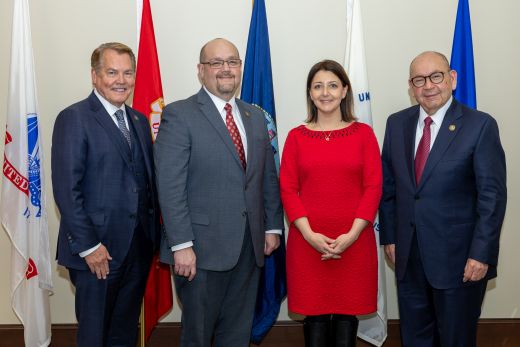Centers for Disease Control and Prevention director visits Chickasaw Nation’s health system

The Chickasaw Nation recently hosted Centers for Disease Control and Prevention Director Mandy K. Cohen, M.D., MPH, to discuss mental health awareness, promoting positive childhood experiences, data modernization, immunizations and other public health initiatives.
It was her first visit to a tribal nation since being appointed.
Chickasaw Nation Governor Bill Anoatubby said the Chickasaw Nation’s collaboration with the Centers for Disease Control and Prevention (CDC) is essential to its efforts in advancing public health of the tribe and its neighbors.
“Our partnership with the CDC is really pivotal,” Governor Anoatubby said. “It gives us regular opportunity to do the things we need to do.”
Governor Anoatubby said the CDC’s support has allowed the Chickasaw Nation to make strides in data modernization.
“It enhances our capacity for effective analytics. It ensures better outcomes for our health and well-being of people in our communities,” he said.
“We focus on what our mission is. Our mission is to enhance the overall quality of life of the Chickasaw people. The more we know, the better job we can do, and (CDC) funding supports our community outreach.
“These efforts are instrumental in addressing a lot of the challenges in our communities, things like substance abuse. We want to focus on preventative health. Maternal, child and family health are also very important to us.”
Governor Anoatubby said the CDC’s information and recommendations were critical to the Chickasaw Nation’s ability to respond quickly to the COVID-19 pandemic.
“The CDC was right at the forefront when it came to leading us through the pandemic,” he said.
“We’re thankful for all the work you did and, of course, the work you’re still doing. It allowed us to respond swiftly. When we got the information, we moved. We counted on the CDC information and the guidelines you provided to us.”
Governor Anoatubby said the Chickasaw Nation’s health system and its employees were able to do a much better job because of the CDC’s guidance during the pandemic.
“We have a multidisciplined team that looked at this information and guided the Chickasaw Nation as a whole and all of its operations. We made decisions that were sound and protected our employees and also our citizens. We moved as rapidly as we could as information became available.
“We made it through the height of the pandemic, and, though COVID-19 is still around today, we’re able to manage it better,” he said.
Governor Anoatubby said CDC funding played an important role in connecting Oklahoma tribes with public health agencies.
“We now have better communication between tribes and public health agencies,” Governor Anoatubby said. “When you have that, you’re going to have a better functioning operation, get more accomplished and be assured our tribal communities have greater access to the resources they need.”
He said CDC funding made it possible to make health care available and more convenient for citizens by way of a mobile unit.
“Our collaboration on the Inchokma Mobile Unit funded by a cooperative agreement with the CDC brings health services directly to the community. We go to them rather than expecting them to come to us.
“By working together, we have also implemented impactful initiatives, such as our naloxone education community events which contribute greatly to preventing opioid misuse under the Define Your Direction program.
“There has been a lot accomplished by working together,” Governor Anoatubby said.
Cohen said one of her goals in visiting the Chickasaw Nation was to understand how the CDC’s investments and partnership with the Chickasaw Nation were working.
“There is so much alignment of what we were trying to achieve, which is fantastic,” Cohen said.
“I think the mission of the CDC to protect and improve lives is so in alignment with what the Governor mentioned about improving quality of life. I think there are ways we can continue to grow our partnership together.
“I think the Chickasaw Nation did a tremendous amount of important work during the pandemic. We’ve all learned a lot of lessons about how we can think about the future. Going forward, I see a lot of opportunity,” she said.